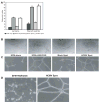Mechanisms of cytomegalovirus-accelerated vascular disease: induction of paracrine factors that promote angiogenesis and wound healing
- PMID: 18637518
- PMCID: PMC2699259
- DOI: 10.1007/978-3-540-77349-8_22
Mechanisms of cytomegalovirus-accelerated vascular disease: induction of paracrine factors that promote angiogenesis and wound healing
Abstract
Human cytomegalovirus (HCMV) is associated with the acceleration of a number of vascular diseases such as atherosclerosis, restenosis, and transplant vascular sclerosis (TVS). All of these diseases are the result of either mechanical or immune-mediated injury followed by inflammation and subsequent smooth muscle cell (SMC) migration from the vessel media to the intima and proliferation that culminates in vessel narrowing. A number of epidemiological and animal studies have demonstrated that CMV significantly accelerates TVS and chronic rejection (CR) in solid organ allografts. In addition, treatment of human recipients and animals alike with the antiviral drug ganciclovir results in prolonged survival of the allograft, indicating that CMV replication is a requirement for acceleration of disease. However, although virus persists in the allograft throughout the course of disease, the number of directly infected cells does not account for the global effects that the virus has on the acceleration of TVS and CR. Recent investigations of up- and downregulated cellular genes in infected allografts in comparison to native heart has demonstrated that rat CMV (RCMV) upregulates genes involved in wound healing (WH) and angiogenesis (AG). Consistent with this result, we have found that supernatants from HCMV-infected cells (HCMV secretome) induce WH and AG using in vitro models. Taken together, these findings suggest that one mechanism for HCMV acceleration of TVS is mediated through induction of secreted cytokines and growth factors from virus-infected cells that promote WH and AG in the allograft, resulting in the acceleration of TVS. We review here the ability of CMV infection to alter the local environment by producing cellular factors that act in a paracrine fashion to enhance WH and AG processes associated with the development of vascular disease, which accelerates chronic allograft rejection.
Figures


Similar articles
-
Human cytomegalovirus secretome contains factors that induce angiogenesis and wound healing.J Virol. 2008 Jul;82(13):6524-35. doi: 10.1128/JVI.00502-08. Epub 2008 Apr 30. J Virol. 2008. PMID: 18448536 Free PMC article.
-
The role of angiogenic and wound repair factors during CMV-accelerated transplant vascular sclerosis in rat cardiac transplants.Am J Transplant. 2008 Feb;8(2):277-87. doi: 10.1111/j.1600-6143.2007.02062.x. Epub 2007 Dec 18. Am J Transplant. 2008. PMID: 18093265
-
Cytomegalovirus latency promotes cardiac lymphoid neogenesis and accelerated allograft rejection in CMV naïve recipients.Am J Transplant. 2011 Jan;11(1):45-55. doi: 10.1111/j.1600-6143.2010.03365.x. Am J Transplant. 2011. PMID: 21199347 Free PMC article.
-
The role of cytomegalovirus in angiogenesis.Virus Res. 2011 May;157(2):204-11. doi: 10.1016/j.virusres.2010.09.011. Epub 2010 Oct 1. Virus Res. 2011. PMID: 20869406 Free PMC article. Review.
-
Cytomegalovirus infection and cardiac allograft vasculopathy.Transpl Infect Dis. 1999 Jun;1(2):115-26. doi: 10.1034/j.1399-3062.1999.010205.x. Transpl Infect Dis. 1999. PMID: 11428979 Review.
Cited by
-
A method for quantifying mechanical properties of tissue following viral infection.PLoS One. 2012;7(8):e42197. doi: 10.1371/journal.pone.0042197. Epub 2012 Aug 3. PLoS One. 2012. PMID: 22870300 Free PMC article.
-
Herpesvirus-bacteria synergistic interaction in periodontitis.Periodontol 2000. 2020 Feb;82(1):42-64. doi: 10.1111/prd.12311. Periodontol 2000. 2020. PMID: 31850623 Free PMC article. Review.
-
MicroRNA-217 promotes angiogenesis of human cytomegalovirus-infected endothelial cells through downregulation of SIRT1 and FOXO3A.PLoS One. 2013 Dec 20;8(12):e83620. doi: 10.1371/journal.pone.0083620. eCollection 2013. PLoS One. 2013. PMID: 24376725 Free PMC article.
-
Immune Landscape of CMV Infection in Cancer Patients: From "Canonical" Diseases Toward Virus-Elicited Oncomodulation.Front Immunol. 2021 Sep 8;12:730765. doi: 10.3389/fimmu.2021.730765. eCollection 2021. Front Immunol. 2021. PMID: 34566995 Free PMC article. Review.
-
Control of Immediate Early Gene Expression for Human Cytomegalovirus Reactivation.Front Cell Infect Microbiol. 2020 Sep 17;10:476. doi: 10.3389/fcimb.2020.00476. eCollection 2020. Front Cell Infect Microbiol. 2020. PMID: 33072616 Free PMC article. Review.
References
-
- Almeida GD, Porada CD, St Jeor S, Ascensao JL. Human cytomegalovirus alters interleukin-6 production by endothelial cells. Blood. 1994;83:370–376. - PubMed
-
- Almeida-Porada G, Porada CD, Shanley JD, Ascensao JL. Altered production of GM-CSF and IL-8 in cytomegalovirus-infected, IL-1- primed umbilical cord endothelial cells. Exp Hematol. 1997;25:1278–1285. - PubMed
-
- Auerbach R, Lewis R, Shinners B, Kubai L, Akhtar N. Angiogenesis assays: a critical overview. Clin Chem. 2003;49:32–40. - PubMed
-
- Billingham ME. Histopathology of Graft Coronary Disease. J Heart Lung Transplant. 1992;11:S38–S44. - PubMed
-
- Bouis D, Kusumanto Y, Meijer C, Mulder NH, Hospers GA. A review on pro- and anti-angiogenic factors as targets of clinical intervention. Pharmacol Res. 2006;53:89–103. - PubMed
Publication types
MeSH terms
Substances
Grants and funding
- R01 HL071695-04/HL/NHLBI NIH HHS/United States
- R01 HL083194/HL/NHLBI NIH HHS/United States
- R01 HL071695/HL/NHLBI NIH HHS/United States
- AI21640/AI/NIAID NIH HHS/United States
- R01 HL066238/HL/NHLBI NIH HHS/United States
- R01 HL088603-01A1/HL/NHLBI NIH HHS/United States
- R01 HL066238-01/HL/NHLBI NIH HHS/United States
- R37 AI021640/AI/NIAID NIH HHS/United States
- R01 AI021640/AI/NIAID NIH HHS/United States
- R01 AI021640-23/AI/NIAID NIH HHS/United States
- R01 HL083194-04/HL/NHLBI NIH HHS/United States
- HL71695/HL/NHLBI NIH HHS/United States
- R01 HL065754-08/HL/NHLBI NIH HHS/United States
- R01 HL085451/HL/NHLBI NIH HHS/United States
- HL083194/HL/NHLBI NIH HHS/United States
- R01 HL088603/HL/NHLBI NIH HHS/United States
- HL65754/HL/NHLBI NIH HHS/United States
- HL 66238-01/HL/NHLBI NIH HHS/United States
- R01 HL065754/HL/NHLBI NIH HHS/United States
LinkOut - more resources
Full Text Sources
Other Literature Sources
Medical

